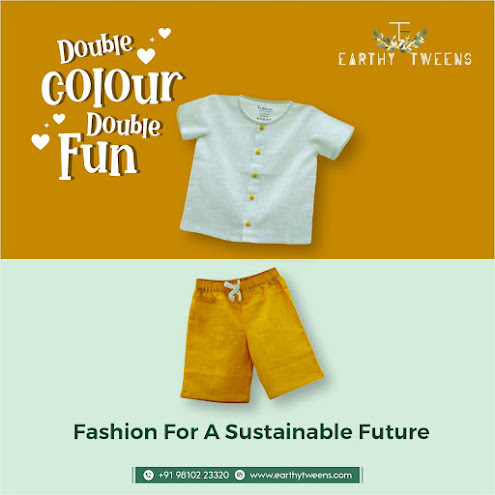Factors to Consider When Choosing Organic Baby Clothes
Introduction:
Choosing the right clothing for your baby is an important decision, especially when it comes to their delicate and sensitive skin. Organic baby clothes have gained popularity among conscious parents due to their numerous benefits. In this post, we will explore the key factors to consider when choosing organic baby clothes, ensuring the best choice for your little one's comfort, safety, and overall well-being. Additionally, we will highlight why Earthy Tweens is the go-to destination for purchasing high-quality organic baby products.
- Material and Fabric: Organic baby clothes are crafted from natural fibers, such as organic cotton, bamboo, or hemp, that are cultivated without the use of harmful chemicals or pesticides. These materials are renowned for their exceptional softness, breathability, and hypoallergenic properties, making them ideal for your baby's sensitive skin. When choosing organic baby clothes, prioritize fabrics that promote comfort and minimize the risk of skin irritations or allergies.
- Certification and Standards: When opting for organic baby clothes, it is vital to look for certifications and standards that guarantee their authenticity. Seek out clothing that bears certifications from renowned organizations like the Global Organic Textile Standard (GOTS) or the Organic Content Standard (OCS). These certifications ensure that the clothes have been produced using organic practices, adhering to strict criteria for sustainability and ethical production.
- Skin-Friendly and Non-Toxic: One of the most significant advantages of organic baby clothes is their absence of harmful chemicals, dyes, or finishes. These clothes are typically colored using natural, non-toxic dyes or are left undyed, reducing the risk of exposing your baby's delicate skin to irritants. By choosing organic clothing, you can minimize the likelihood of skin rashes, respiratory issues, or allergic reactions.
- Comfort and Breathability: Babies have delicate skin that is prone to sweating and heat rashes. Organic fabrics, such as organic cotton, excel in breathability and allow for proper air circulation, keeping your baby cool and comfortable. These fabrics possess moisture-wicking properties that draw moisture away from the skin, preventing discomfort and ensuring a pleasant experience for your little one.
- Durability and Longevity: Investing in organic baby clothes not only benefits your baby but also contributes to sustainable practices. Organic fabrics are renowned for their durability and longevity, often surpassing conventional clothing in terms of lifespan. They can withstand frequent washing without losing their shape or softness, allowing them to be passed down to younger siblings or donated, thereby minimizing waste and promoting sustainability.
- Ethical and Sustainable Production: When selecting organic baby clothes, it is crucial to consider brands that prioritize ethical and sustainable production practices. Earthy Tweens is an excellent choice for purchasing organic baby products as they are committed to supporting better working conditions and providing equal employment opportunities to individuals involved in the production process. By choosing Earthy Tweens, you contribute to addressing poverty and promoting sustainable livelihoods for less fortunate women.
Conclusion:
Choosing organic baby clothes entails considering crucial factors such as material, certifications, skin-friendliness, comfort, durability, and ethical production. By making informed choices, you can provide your baby with clothing that is safe, comfortable, and environmentally friendly. Additionally, selecting organic baby products from Earthy Tweens allows you to support.



Comments
Post a Comment